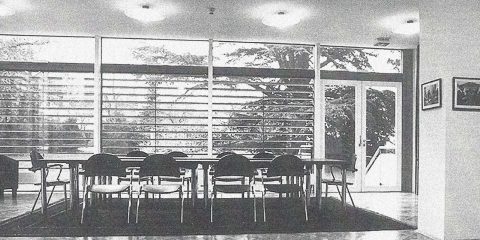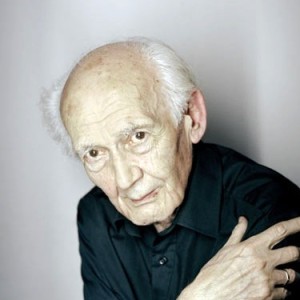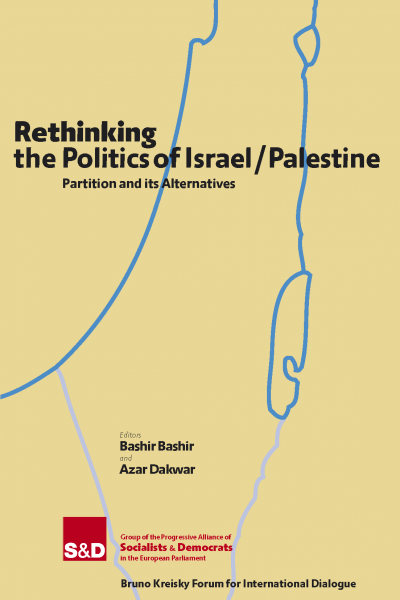Palestinian residents of Jerusalem have the right to apply for Israeli citizenship, but in order to acquire it they have to demonstrate a moderate acquaintance with Hebrew, renounce their Jordanian or other citizenship and swear loyalty to Israel. More than 95 per cent have refused to do this, on the grounds that it would signal acquiescence in and legitimation of Israel’s occupation. Since the city was first occupied 47 years ago, more than 14,000 Palestinians have had their residency revoked. As permanent residents, Palestinians in Jerusalem are entitled to vote in municipal (but not Israeli national) elections, yet more than 99 per cent boycott them. With no electoral incentive to satisfy the needs of Palestinians, the city’s politicians neglect them.
All Jerusalemites pay taxes, but the proportion of the municipal budget allocated to the roughly 300,000 Palestinian residents of a city with a population of 815,000 doesn’t exceed 10 per cent. Service provision is grossly unequal. In the East, there are five benefit offices compared to the West’s 18; four health centres for mothers and babies compared to the West’s 25; and 11 mail carriers compared to the West’s 133. Roads are mostly in disrepair and often too narrow to accommodate garbage trucks, forcing Palestinians to burn rubbish outside their homes. A shortage of sewage pipes means that Palestinian residents have to use septic tanks which often overflow. Students are stuffed into overcrowded schools or converted apartments; 2200 additional classrooms are needed. More than three-quarters of the city’s Palestinians live below the poverty line.
Since 1967 no new Palestinian neighbourhoods have been established in the city, while Jewish settlements surrounding existing Palestinian areas have mushroomed. Restrictive zoning prevents Palestinians from building legally. Israel has designated 52 per cent of land in East Jerusalem as unavailable for development and 35 per cent for Jewish settlements, leaving the Palestinian population with only 13 per cent, most of which is already built on. Those with growing families are forced to choose between building illegally and leaving the city. Roughly a third of them decide to build, meaning that 93,000 residents are under constant threat of their homes being demolished.
The government has no shortage of bureaucratic explanations for this unequal treatment, but it doesn’t always try to hide the ethno-religious basis of its discrimination. After the recent terrorist attacks by both Jews and Palestinians in Jerusalem and the West Bank, the government demolished the homes only of the Palestinian perpetrators. Palestinians who live in houses abandoned during the 1948 war have been evicted to make room for Jewish former owners and their descendants, but the reverse has yet to occur.
Jerusalem was once the cultural, political and commercial capital for Palestinians, connected to Bethlehem in the south and Ramallah in the north. But the construction of the separation wall cut Jerusalemites off from the West Bank and from one another. The route of the wall was chosen to encompass as many East Jerusalem and West Bank Jewish settlements as possible while excluding the largest possible number of Palestinians. In the Jerusalem area, only 3 per cent of the wall follows the pre-1967 border. The wall divides the Palestinians in Jerusalem into two groups: three-quarters have found themselves on the Israeli side; a quarter are on the West Bank side, and are now forced to wait in long lines at checkpoints to get to schools and other services. Some smaller Palestinian villages are completely encircled by the wall.
Because areas on the West Bank side of the barrier are still within Jerusalem’s municipal boundaries, the Ramallah-based Palestinian Authority is forbidden to enter them. But the Israeli police, in common with the providers of other basic municipal services, largely refuse to go to these places. Despite this, residents are still obliged to pay municipal taxes, in order to qualify for healthcare and benefits. These neighbourhoods have become a no man’s land where criminals can escape from both Israel and the PA.
In Palestinian areas on the Israeli side of the wall, too, crime has become pervasive. Israeli security forces tend to enter these areas only when there’s a security threat to Israeli Jews. The Israeli security presence in East Jerusalem is made up mostly of paramilitary units, which are there essentially to quash dissent and prevent attacks on settlers rather than to protect Palestinians. Non-co-operation with Israeli forces, because of rejection of their authority or out of fear of being seen as collaborating, has allowed gangs to proliferate. They are involved in robberies, drug smuggling, gun-running and extortion, which affects large numbers of Palestinian businesses. Rising crime and insecurity have helped make East Jerusalem a ghost town at night.
Unrest and ethnic tension have been increasing for some time now, but only since July have people been referring to the growing protests and violence as an intifada. At the end of June, the Israeli army discovered the bodies of three teenage students at West Bank yeshivas who had been murdered earlier that month. The next day, hundreds of Jews demonstrated in West Jerusalem, chanting ‘Death to the Arabs,’ ‘Mohammad is Dead’ and similar slogans. Several dozen protesters attacked Palestinian workers and passers-by. Before sunrise the next morning, three Jewish nationalists abducted a randomly selected 16-year-old Palestinian called Mohammed Abu Khdeir, from the upper-middle-class neighbourhood of Shuafat, beat him and burned him alive.
In the days following his murder, riots broke out in Palestinian areas of Jerusalem. A new light railway that passes through Shuafat on its way to the nearby settlement of Pisgat Ze’ev has been repeatedly stoned and the service suspended. Demonstrations spread when the war in Gaza broke out a week after Abu Khdeir’s murder. Since then, protests have taken place in East Jerusalem nearly ever day.
Two of the focal points are Silwan, south-east of the Old City walls, where Jewish settlers with state-funded private security guards have taken over numerous buildings, and the Haram al-Sharif, known to Jews as Har HaBayit (the Temple Mount), where Israel has been restricting Palestinian access and allowing more visits by a small but vocal Jewish minority which boasts a minister and deputy ministers in the present government and which ignores ultra-orthodox prohibitions by advocating prayer and even the construction of a third Jewish temple on the site.
Jerusalem’s mayor, Nir Barkat, said recently that the number of incidents involving stone-throwing and Molotov cocktails had risen from two hundred per month in the period preceding the Gaza war to five thousand per month since. More than a thousand Palestinians in Jerusalem, most of them minors, have been detained since July – four times the total arrested in East Jerusalem for security-related offences between 2000 and 2008, a period that includes the Second Intifada.
To counter the unrest, the Israeli government has seconded a thousand special forces officers to the Jerusalem police; deployed four extra border police units; conducted large-scale raids and increased the presence of paramilitary forces in East Jerusalem; established checkpoints and barricades around Palestinian areas; called on Israelis who have firearms licences to join a volunteer security force; ordered the houses of Palestinian attackers to be demolished and their relatives arrested; dispersed crowds by hosing them with a foul-smelling liquid known as the ‘skunk’; erected concrete barricades at stations; formed a police task force to address the violence; threatened to fine parents of teenage demonstrators; proposed prison sentences of up to twenty years for throwing rocks; and handed out fines in Palestinian neighbourhoods for such minor offences as jaywalking and spitting out the shells of sunflower seeds.
So far, none of these measures has had much effect. Growing numbers of Palestinians, particularly in East Jerusalem, have been injured and in several cases killed by Israeli forces. In November, another Palestinian teenager in East Jerusalem was abducted and beaten, but left alive. Several Palestinians in the West Bank have been deliberately run over by Israelis in recent months. Attacks on Israelis have increased sharply. A leading supporter of Jewish prayer in the Haram al-Sharif/Temple Mount was shot. Two axe, knife and gun-wielding Palestinians from East Jerusalem killed a police officer, a worshipper and three ultra-orthodox rabbis at a West Jerusalem synagogue on 18 November. There have been gruesome attacks on Israeli soldiers and civilians by Palestinians using guns and knives and vehicles. More Israelis have died in such incidents in recent weeks than in 2012 and 2013 combined.
The prime minister, Benjamin Netanyahu, and the foreign minister, Avigdor Lieberman, as well as Israeli government spokesmen, have claimed that the Palestinian president, Mahmoud Abbas, is inciting this violence, but this assertion is aimed at thwarting Abbas’s diplomatic initiatives rather than providing a sober assessment of the causes of the unrest. As Israel’s senior security officials have stated, recent attacks have actually been the work of ‘lone wolves’ – spontaneous acts of violence, not committed by followers of a particular political faction. They stem precisely from the absence of Palestinian political leadership, unified or otherwise.
*
Palestinians in general feel disconnected from their political leaders, but the sense of abandonment is particularly acute in Jerusalem, where the PA is strictly forbidden from acting and to which Ramallah, like most of the Arab world, devotes many lofty words but very few deeds. When he assented to the five-year interim arrangements for Palestinian self-governance in the Oslo Accords, Yasser Arafat agreed to exclude Jerusalem from the areas that would be governed pro tempore by the PA. Local leaders, notably the late Faisal Husseini, refused to agree to this, which is one reason Yitzhak Rabin, who resolutely opposed dividing Jerusalem when he was prime minister and said he would rather abandon peace than give up a united capital, chose to bypass Husseini and instead pursued secret negotiations in Oslo with Arafat’s emissaries.
Palestinians in Jerusalem have been bereft of political leaders since Husseini’s death in 2001. All four of Jerusalem’s representatives in the Palestinian parliament – all of them members of Hamas, elected in 2006 – have been deported. Shin Bet, Israel’s internal security agency, monitors ‘political subversion’, which includes lawful opposition to the Israeli occupation. Since all Palestinian political parties oppose the occupation, they and their activities have, in effect, been criminalised. Even innocuous Palestinian institutions such as the Jerusalem Chamber of Commerce have been shut down. Years of Israeli suppression of Palestinian political activity have ensured that when violence erupts in Jerusalem, there is no legitimate leadership to quell it; and spontaneous, unorganised protests and attacks are far more difficult for the security forces to thwart and contain.
The notion that Abbas has incited them to protest is laughable to Palestinians in Jerusalem. When permitted entry to the city, his representatives and associates have been verbally and physically attacked by Palestinian residents. A former religious affairs minister and his bodyguards were hospitalised after an assault while they were in the Haram al-Sharif, and a PA governor was shouted out of the mourning tent of the family of Abu Khdeir. The PA is accused of standing idly by as a withering Palestinian Jerusalem has been encircled, divided and constricted.
Abbas is adamantly opposed to leading an intifada, peaceful or otherwise, and he will almost certainly resign if a new one begins. Understanding his deep-seated abhorrence of violence, Hamas agreed to a joint campaign of peaceful protest with Abbas’s Fatah movement in the West Bank, but Abbas and the security forces under his command have continued to act against such demonstrations. Even now, with Hamas’s rise in popularity after the Gaza war and Palestinian frustration in Jerusalem and cities within Israel, Abbas has refused even the non-violent means of pressuring Israel that have been available to him for several years, such as supporting the boycott of goods not just from the settlements but from the state that creates and supports them, and curtailing security co-operation with Israel. Thanks in part to collaboration between Israeli and Palestinian security forces, Palestinian dissent is more conspicuous in areas outside the PA’s control: hunger strikes in Israeli prisons, boycotts and divestment in the diaspora, and protests and violence in Palestinian communities in Israel and Jerusalem. When the PLO’s political strategy is to submit resolutions to the UN Security Council which it knows in advance will be vetoed, it is little wonder that Palestinians in Jerusalem are acting on their own.
The current upsurge in protests and violence has been called the silent intifada, the individual intifada, the children’s intifada, the firecracker intifada, the car intifada, the run-over intifada, the Jerusalem intifada and the third intifada. But what it most closely resembles isn’t the First (1987-93) or the Second (2000-05) Intifada but the surge in unco-ordinated, leaderless violence that preceded the largely non-lethal protests in the early part of the First Intifada. Then, as now, such violence was blamed wrongly on the PLO leadership. Then, as now, that leadership appeared defeated and in decline. The PLO had been ousted from Lebanon, Israeli settlements were expanding, and Palestinians didn’t see how their leaders could achieve the national movement’s goals. As in 2006, local nationalist leaders in the West Bank came to power in 1976 in elections whose results Israel sought to undo. These legitimate leaders were toppled and deported, and more compliant, unelected figures were put in their place. Then, as now, with no organised leadership in the West Bank and Gaza offering a clear strategy of national liberation, sporadic assaults on Israelis, not attributable to any political faction, were on the increase.
The crucial difference between the mid-1980s and today is that Palestinian civil society is now much weaker, and so, too, is the likelihood of coherent political organisation of the kind that emerged soon after the First Intifada began. The groups that then channelled political activity have been supplanted, either by the institutions of a technocratic PA whose existence is premised on close co-operation with Israel, or by NGOs whose foreign funders make assistance conditional on the pursuit of apolitical development projects or vague peace-building strategies that explicitly rule out non-violent confrontation with Israel and any initiative likely to drive up the costs of military occupation. Palestinian society is afflicted with dependency, and it is dependent on forces that wish to preserve the status quo.
*
Israelis don’t like to admit it, but both intifadas brought significant progress to the Palestinians in their quest for liberation. After a short-term increase in the scope and severity of the occupation, Palestinians were given greater autonomy, not just from Israel but also, in the First Intifada, from Jordan, which renounced all claims to the West Bank in 1988. No less important, after both uprisings Israel, the US and the international community moved closer to Palestinian positions.
Israel, however, took steps to immunise itself against some of the weaknesses exposed by these uprisings. After the First Intifada, it established the PA, to which it outsourced much of its responsibility for crowd control and counter-terrorism, thereby limiting the exposure of its soldiers. The PA was financed mainly by Europe and the US, which also made Israel less vulnerable to economic pressure, such as the non-payment of taxes or the mass resignation of public employees. It allowed fewer Palestinian workers into Israel, protecting the economy from the effects of strikes. During and after the Second Intifada, Israel took measures to protect its population on both sides of the pre-1967 borders, erecting the separation barrier, removing settlers and soldiers from Gaza, and further restricting the movements of residents of Gaza and the West Bank.
With all the despairing talk today of the impossibility of a two-state solution and the inevitability of protracted civil war in a single state, it is easy to forget how different the conflict looked two intifadas ago. Before the First Intifada, no one of any importance spoke of Palestinian statehood, rather than autonomy. Today statehood is publicly accepted, even if only rhetorically, not just by the US and the UN but by a long-serving Israeli prime minister from the hawkish Likud. Before the First Intifada, Israel and the US refused to engage with the PLO. Dividing Jerusalem was unthinkable, as was the idea of partition along the pre-1967 borders, with equal swaps. Today these are the positions of most of the international community and growing numbers in Israel. Many Israelis, however, see no reason for their country to take substantial risks and pay a large cost to change an imperfect but long-lasting and manageable status quo. It would be a great tragedy if nothing less than a third uprising, at a terrible price, could convince them otherwise.
21 November 2014
Nathan Thrall is a senior analyst with the Middle East and North Africa Programme of the International Crisis Group. He lives in Jerusalem.



